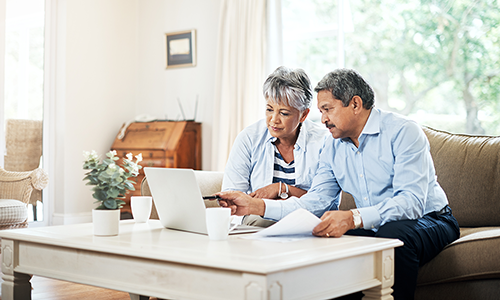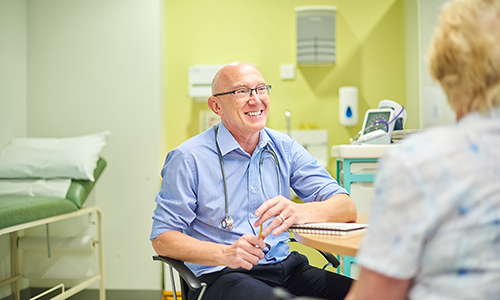Shining a light on it, let’s start by defining what is pancreatic cancer? Simply put – it’s a cancer that’s found anywhere in the pancreas – an organ in the top part of your abdomen that produces digestive juices and hormones. Pancreatic cancer is when abnormal cells in the pancreas start to divide and grow in an uncontrolled way and form a growth (tumour).
What are the statistics for pancreatic cancer?
Diving into current Cancer Research UK statistics, there are around 10,500 new pancreatic cancer cases in the UK every year – that’s 29 every day – making it the tenth most common cancer in the country right now, and sadly the fifth most common cause of cancer death.
With no standard screening or early detection test method available, knowledge is one of the best weapons in the fight against this lesser-known cancer to help achieve the best outcome.

So, let’s start by building knowledge of pancreatic cancer symptoms. What do you need to look out for?
With pancreatic cancer often not causing symptoms in the early stages, and many symptoms coming and going at the start, this can be a tricky question to answer. But according to the NHS and Pancreatic Cancer UK the main symptoms of pancreatic cancer can include:
- Jaundice (yellow skin or eyes, and itchy skin)
Jaundice is caused by the bile duct becoming blocked by the cancer. Signs of jaundice can include yellow skin and eyes, dark urine, pale poo and itchy skin. - Unexplained weight loss or loss of appetite
Pancreatic cancer can affect the important role that the pancreas plays in digesting food and controlling blood sugar levels. This in turn can lead to weight loss and the feeling of not being able to swallow food properly due to feeling full quickly when eating.
- Indigestion
Indigestion can leave you feeling bloated and causes a painful, burning feeling in your chest. It can also leave a bitter, unpleasant taste in the mouth.
- Changes to your poo
Pancreatic cancer can cause diarrhoea and constipation. Also look out for pale, oily poo (called steatorrhoea), which may be difficult to flush away. This is caused by fat in the poo due to the cancer affecting digestion. - Stomach pain or back pain
The pain may start as general discomfort or tenderness in the stomach and back, which can feel worse when lying down or when eating.
Other possible symptoms include a high temperature or feeling shivery, recently diagnosed diabetes, feeling or being sick, blood clots, and having no energy.
It’s important to remember that having these symptoms doesn’t always mean pancreatic cancer, and someone with pancreatic cancer may also not have all the symptoms listed, but we recommend getting them checked out by your GP to be sure.
If you’ve decided to have a check-up, what can you expect to happen at your GP appointment?
Your doctor will want to build up a picture of what's going on. To do this, they will ask you some questions, which include:
- what symptoms you have
- when you get them
- whether anything makes them better or worse
During the appointment your doctor may want to examine you. This could include feeling your abdomen area, looking at your skin and eyes, and they might ask you to have a blood test and give a urine sample to check for signs of jaundice.
After your examination, your doctor may need to refer you to hospital for tests or to see a specialist if they think you have a condition that needs to be investigated. This may be an urgent referral, usually within two weeks, if you have certain symptoms. However, this does not definitely mean you have cancer.
Waiting for your GP appointment can be anxiety-inducing, with many thoughts running through your mind. But how can you best prepare for your GP appointment, to arm yourself with the right information?
Your doctor might not be able to answer all of your questions on the day, but more knowledge can help to calm any anxieties you might have.
Good questions to ask are:
- what could be causing these symptoms?
- are there any tests I should be referred for, and what are they? If not, can you explain why you think I don’t need to have any tests or see a specialist?
- will I find out about my appointment by post or telephone?
- how long will I have to wait for tests and the results?
- if these symptoms don’t improve, how soon should I come back and see you?
- is there anything I can do to help myself with the symptoms?
- where can I get more information or support?

Is there anything you can do to reduce your chance of getting pancreatic cancer?
A lot of the evidence around reducing the risk of getting pancreatic cancer is unclear, with some studies finding that some things increase the risk, while others show that the same thing has no effect.
There is no sure-fire way to prevent pancreatic cancer – with some risk factors including age, gender, race, blood group and family history that can’t be controlled. But the information below is about the factors research suggests may lower someone’s chance of getting it.
- Body weight and physical activity
Research shows that being overweight or obese increases the risk of pancreatic cancer. If you are overweight and need help getting to and staying at a healthy weight, alongside increasing your regular physical activity, the NHS website has information to help you. - Watch your diet
Processed red meats (such as beef, lamb, ham, bacon and salami) and sugary drinks may also increase the risk of pancreatic cancer. Processed meat is meat that has been preserved by smoking, curing, salting or adding chemical preservatives. - Cut down on alcohol
Heavy alcohol use has been tied to pancreatic cancer in some studies, as well as leading to conditions such as chronic pancreatitis, which is known to increase pancreatic cancer risk. It is advised on the NHS website to avoid drinking more than 14 units a week. You can find help on their website with cutting down on alcohol. - Quit smoking
It’s estimated that smoking causes more than one in five pancreatic cancers (22%) in the UK. Your risk of pancreatic cancer increases the more you smoke, and the longer you have smoked for. There’s currently no evidence about e-cigarettes and risk of pancreatic cancer. If you smoke, the NHS website has information to help you stop.
And remember...
You can get in touch to get support for you or someone you care about, including:
- Guidance about cancer – we have a team of Registered Nurses with extensive oncology experience who can take the time to attend to your needs or concerns at your pace.
- Practical support – we can help with absolutely anything that would make life easier such as chasing appointments, accessing benefits, and speaking to your employer.
- Emotional support – we're here to provide a safe space when you need someone to talk to about cancer.
As leaders in cancer support, we want to do all we can to shine a light on the various cancer types and achieve the best possible outcome for everyone. Arming yourself with the power of knowledge can really make a difference when it comes to pancreatic cancer.
